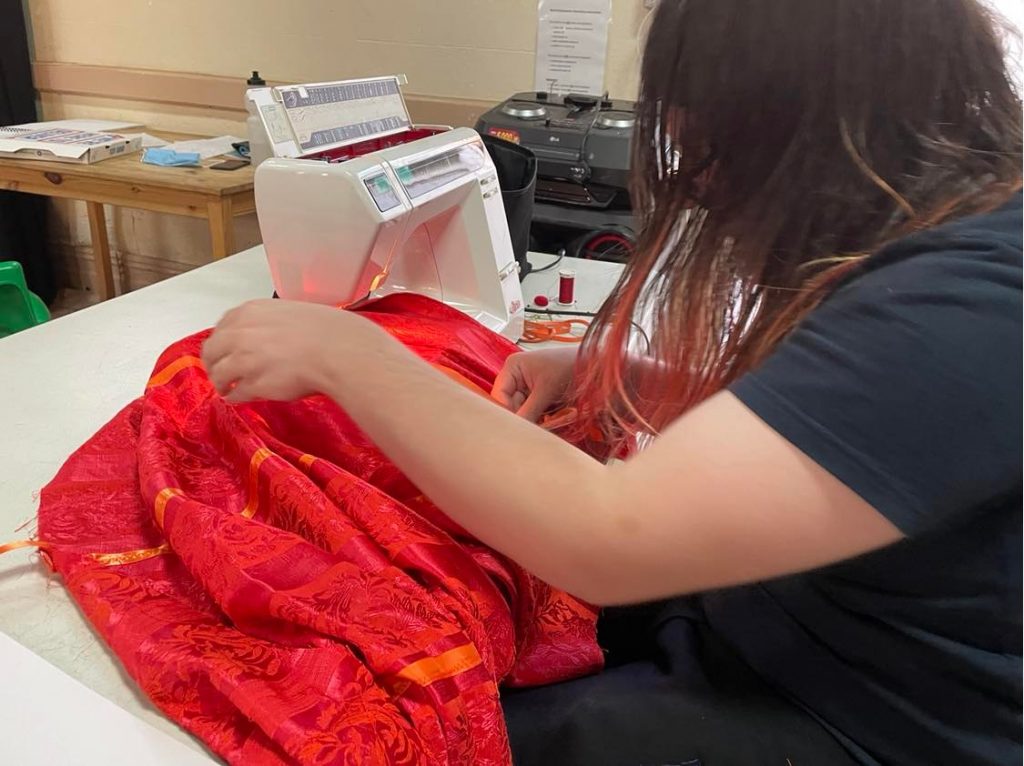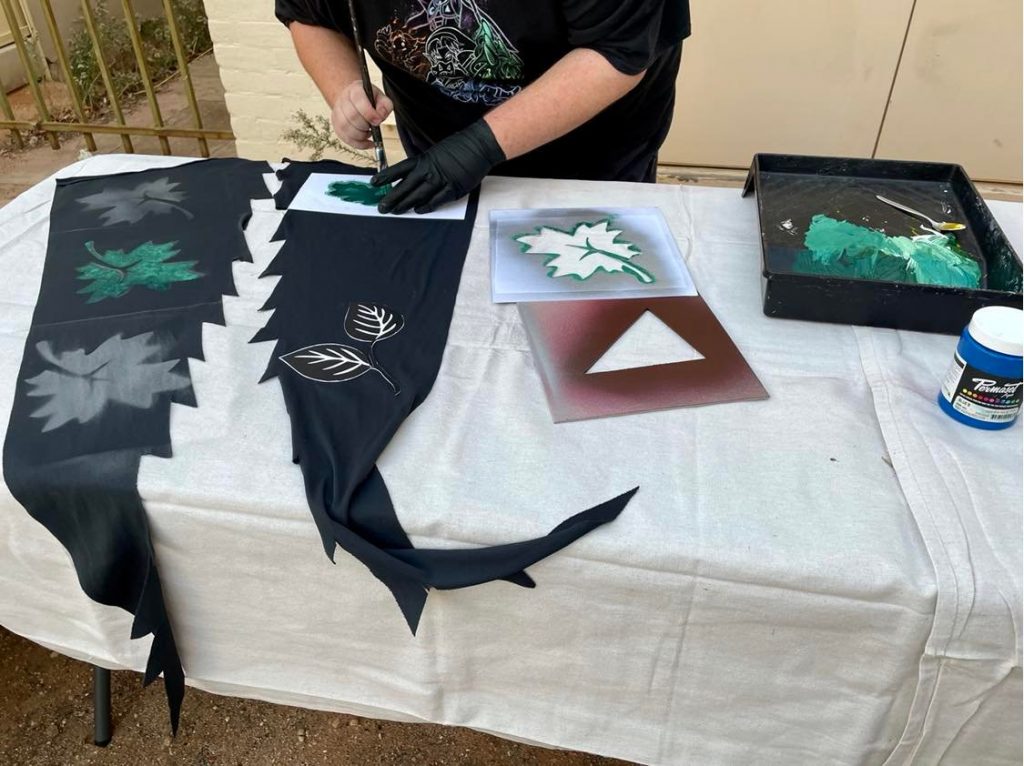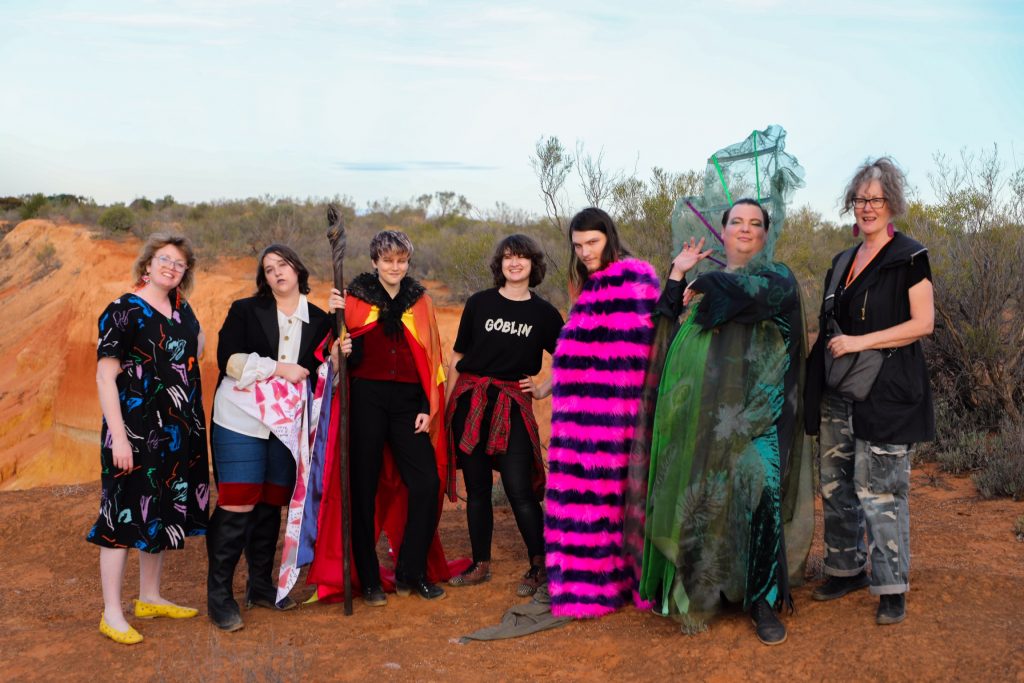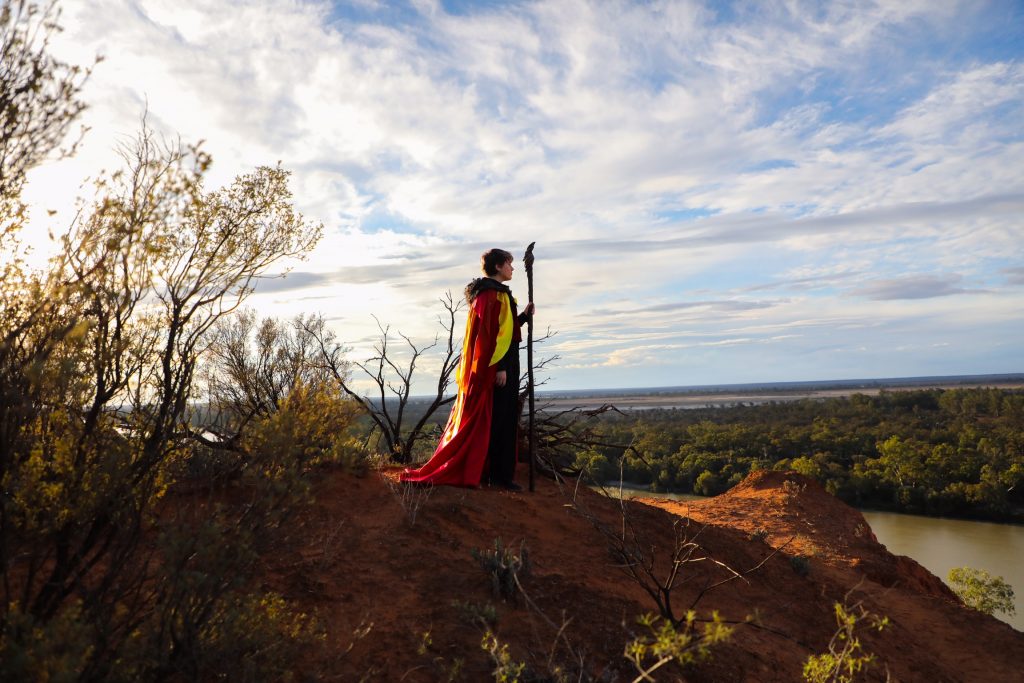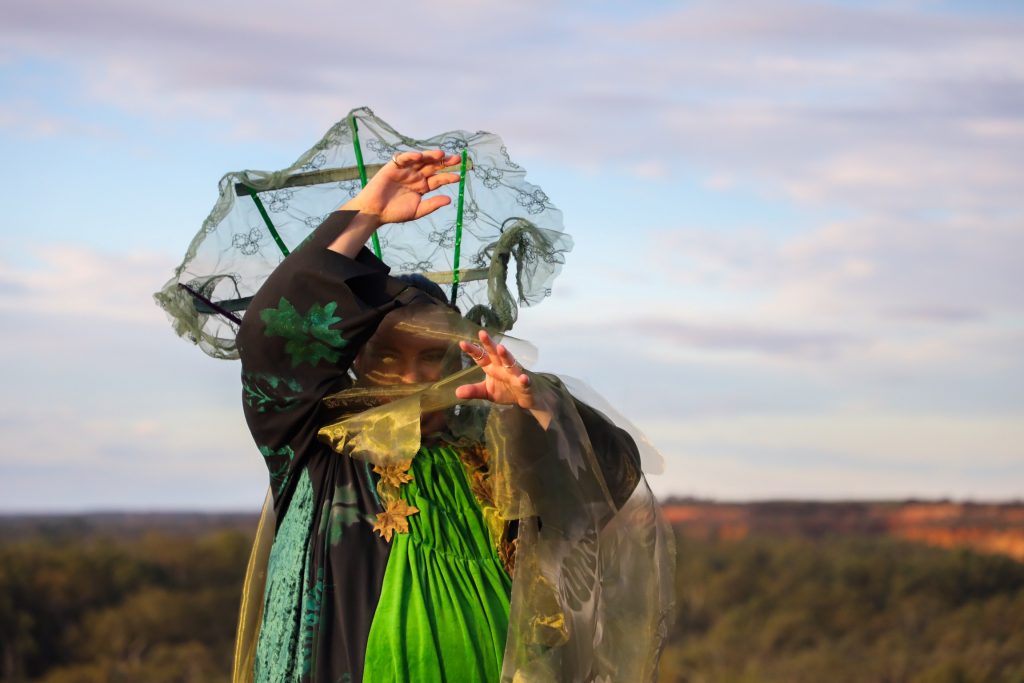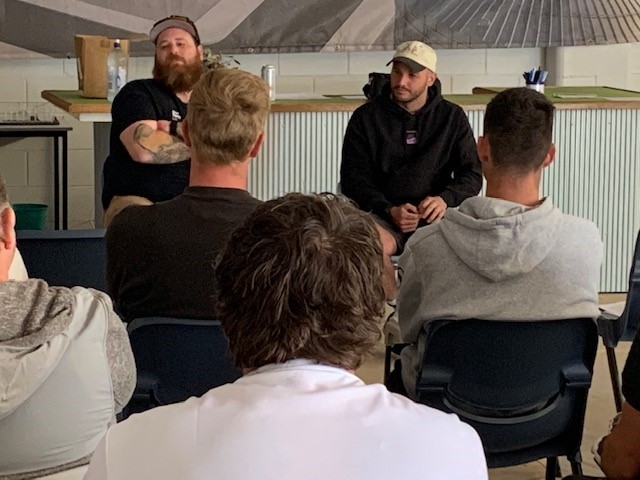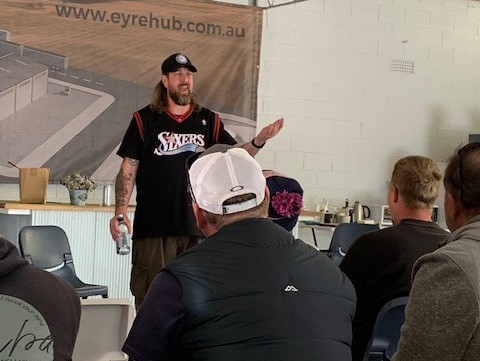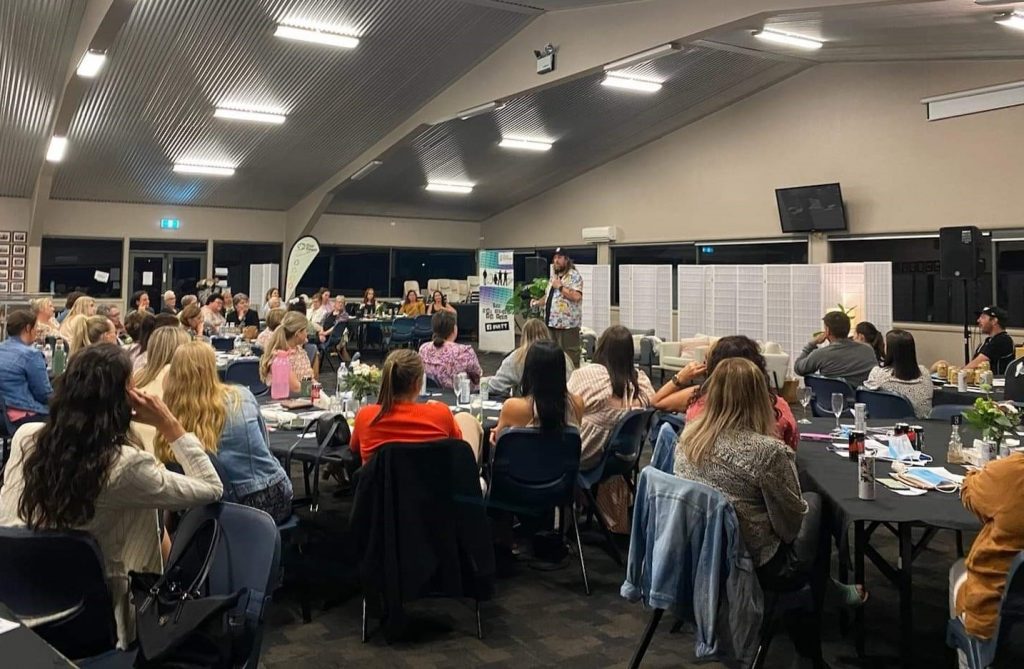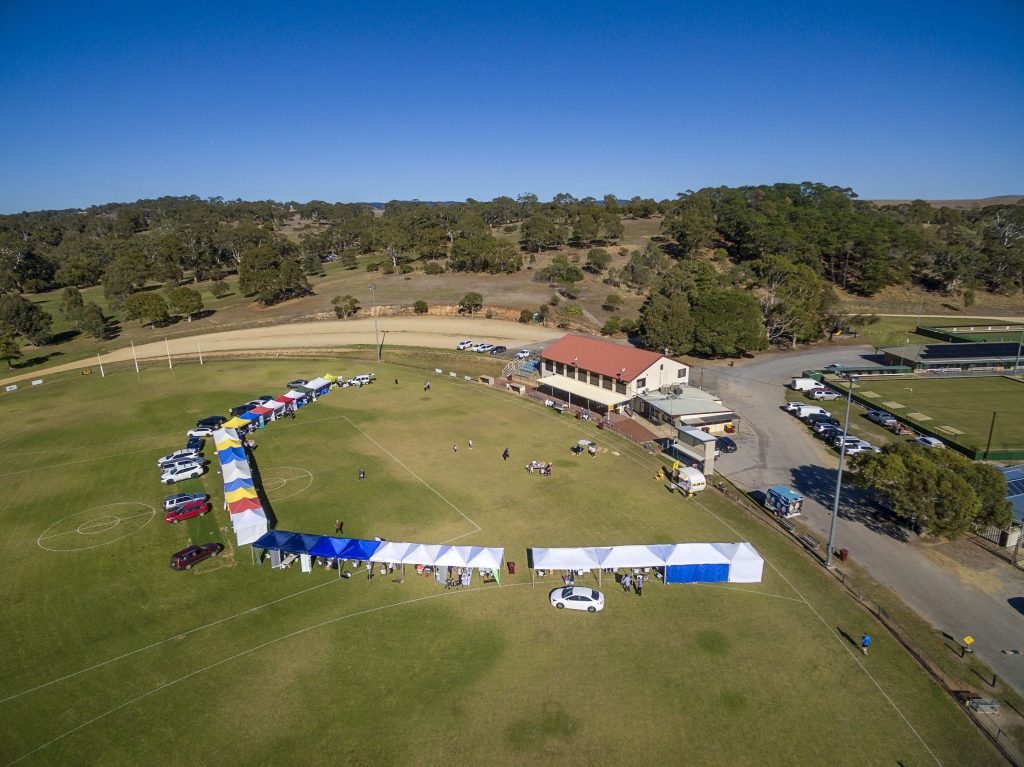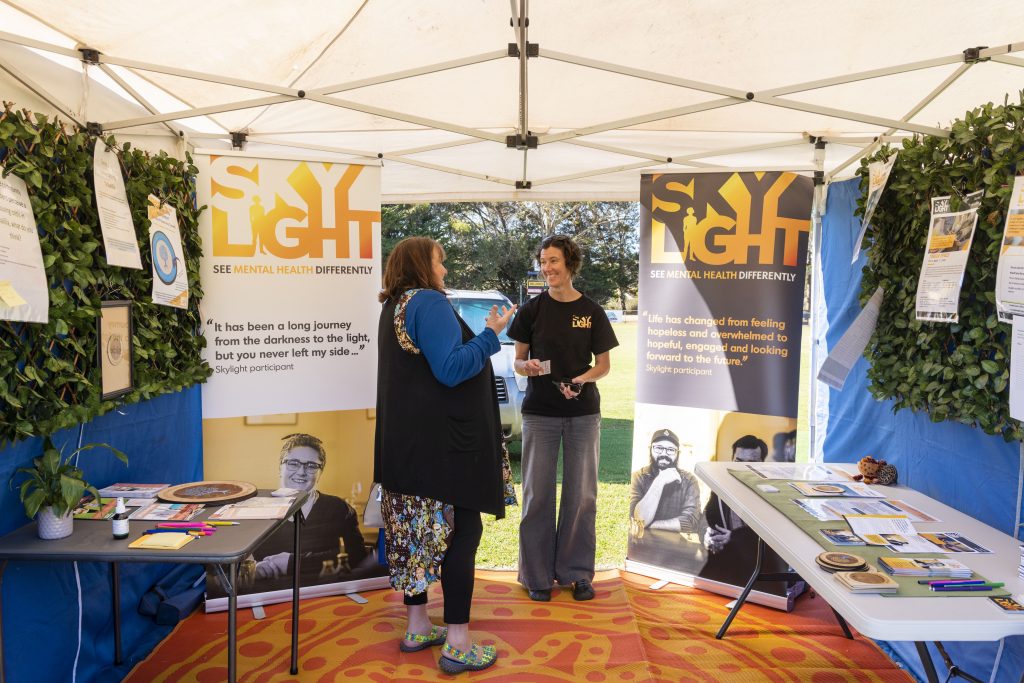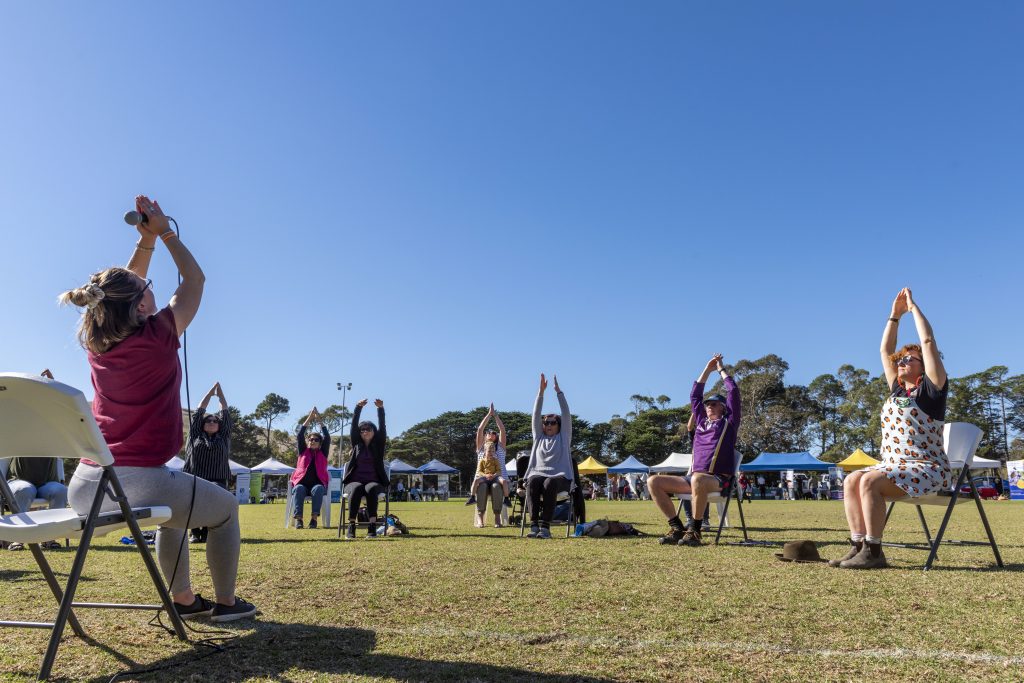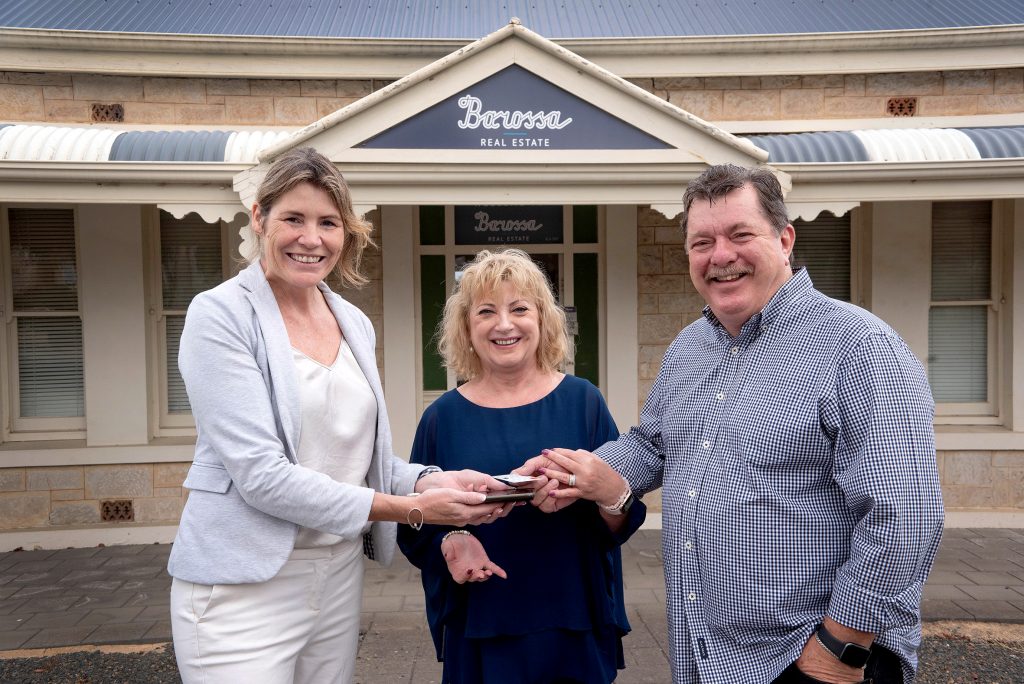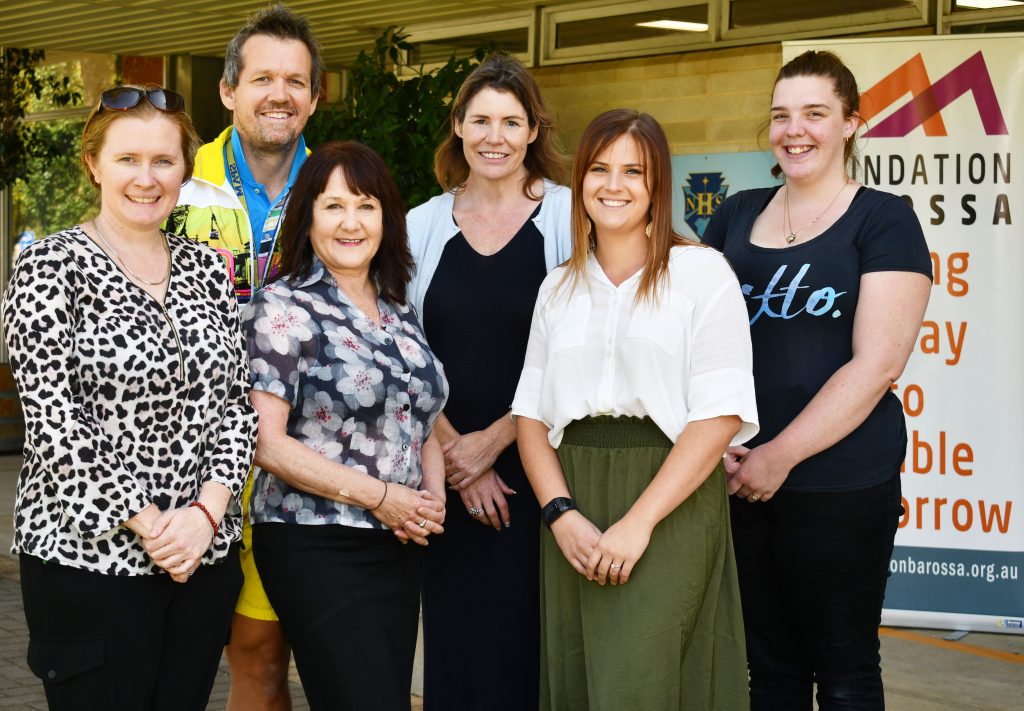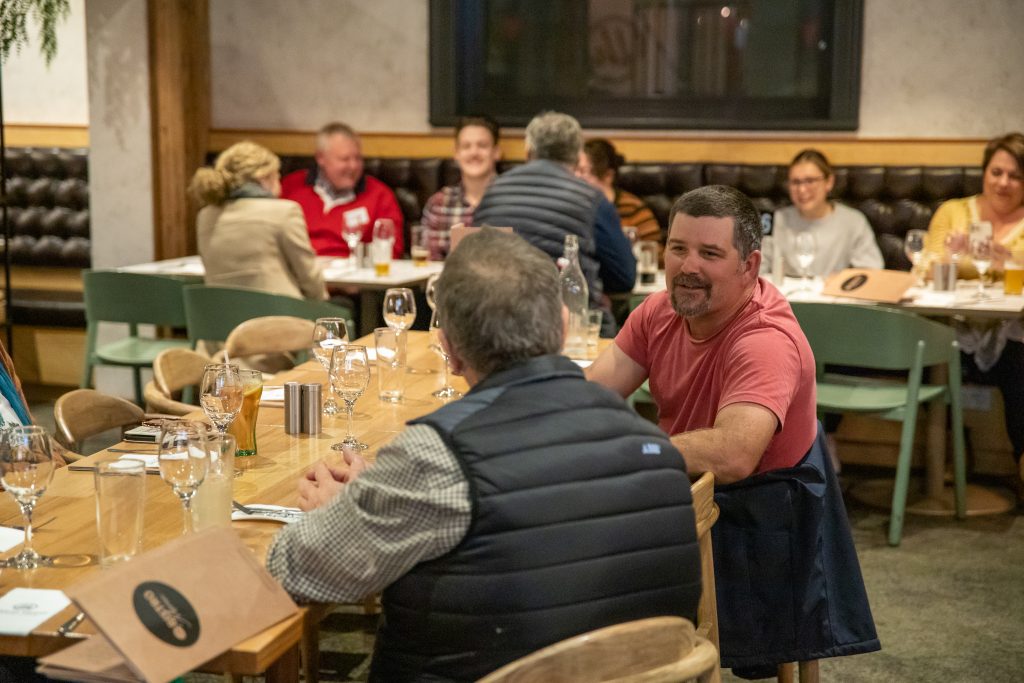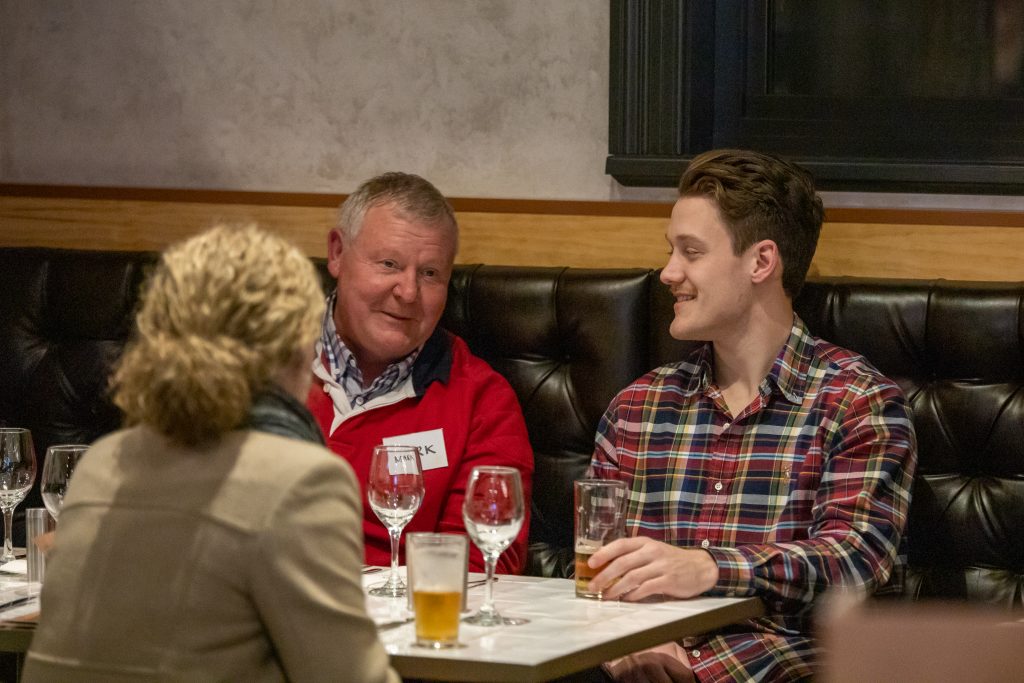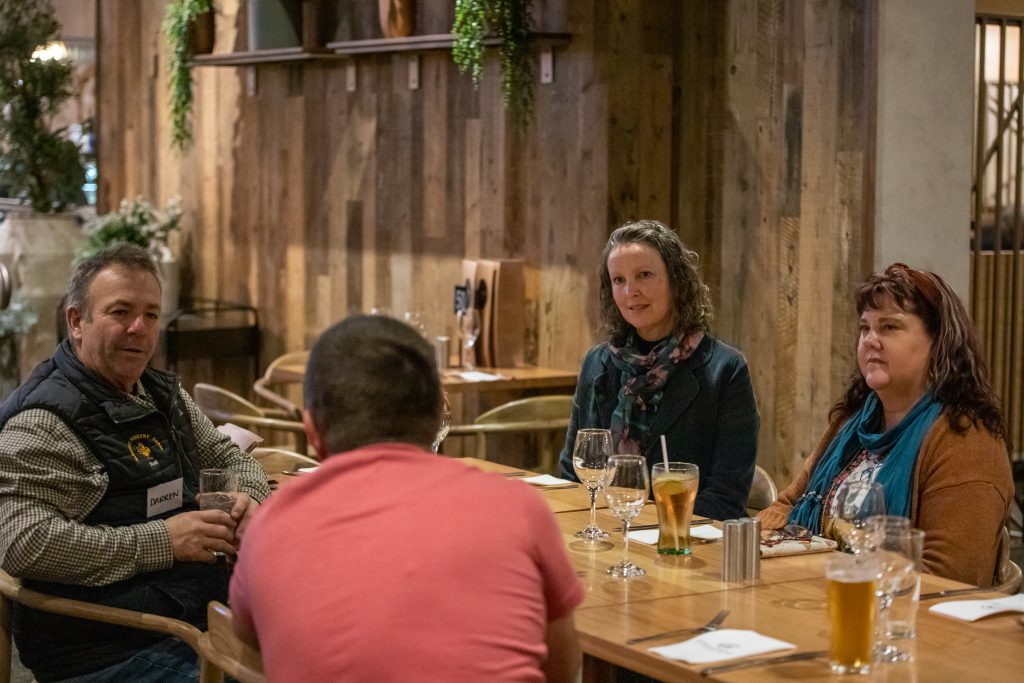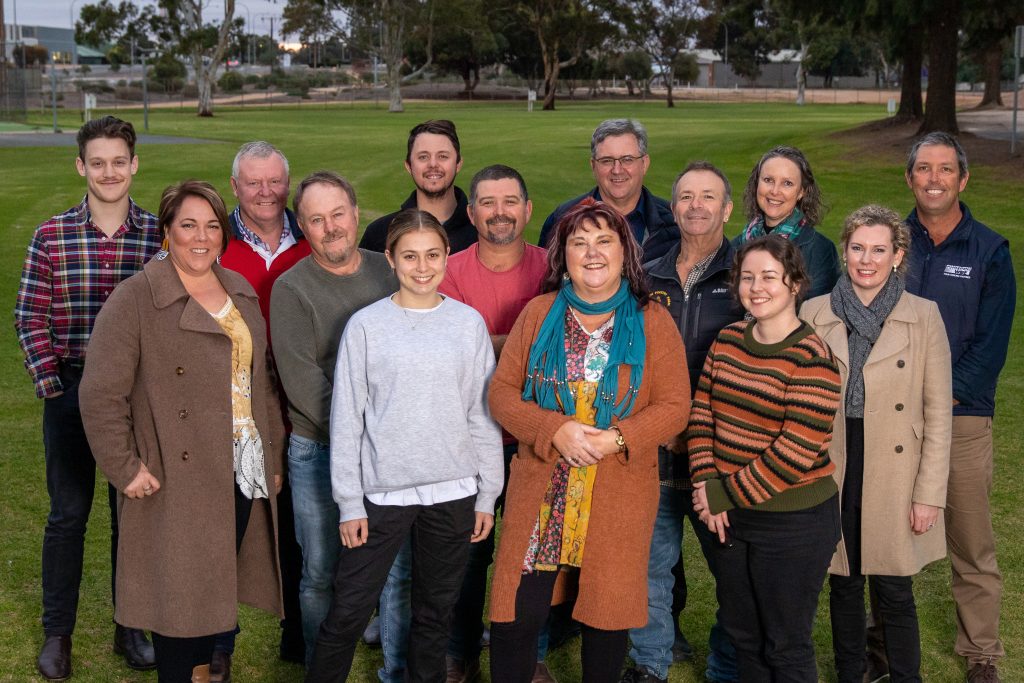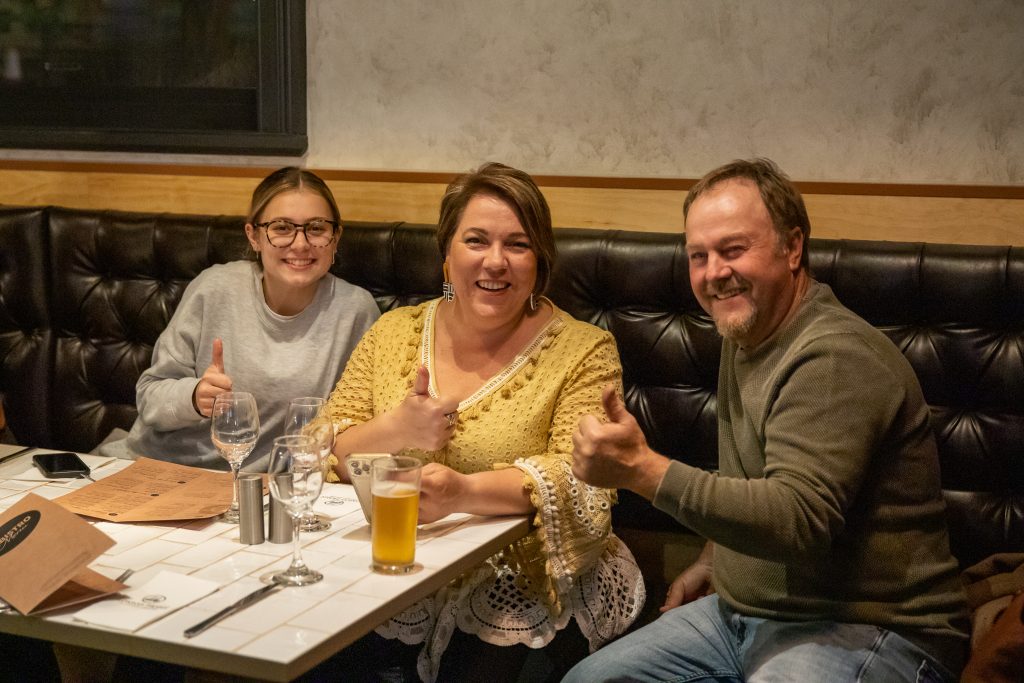Foundation for Rural & Regional Renewal (FRRR)
The townships of Loxton and Waikerie are the main service centres in the Riverland of South Australia, around 200 kms north‐east of Adelaide. In 2021, the Riverland was drought declared, with population, economic and environmental challenges evident.
Little Town Productions saw an opportunity to leverage the annual Loxton Lights Up Festival to bring new people to town to boost the local economy, as well as connect and engage locals, while also building skills, especially among the young people in the region, and having some fun.
The District Council of Loxton and Waikerie received a $55,859 Tackling Tough Times Together (TTTT) grant on behalf of Little Town Productions, enabling them to bring their ideas to fruition.
Coinciding with the 30th anniversary of the Lights Up Festival, Little Town Productions created and coordinated a spectacular and innovative illuminated production featuring a unique animated projection mapped to the façade of the historic St Peter’s church. The first of its kind in Loxton and the Riverland region, SHINE ran for eight days in the lead up to Christmas and drew thousands of visitors from Adelaide, regional South Australia and interstate.


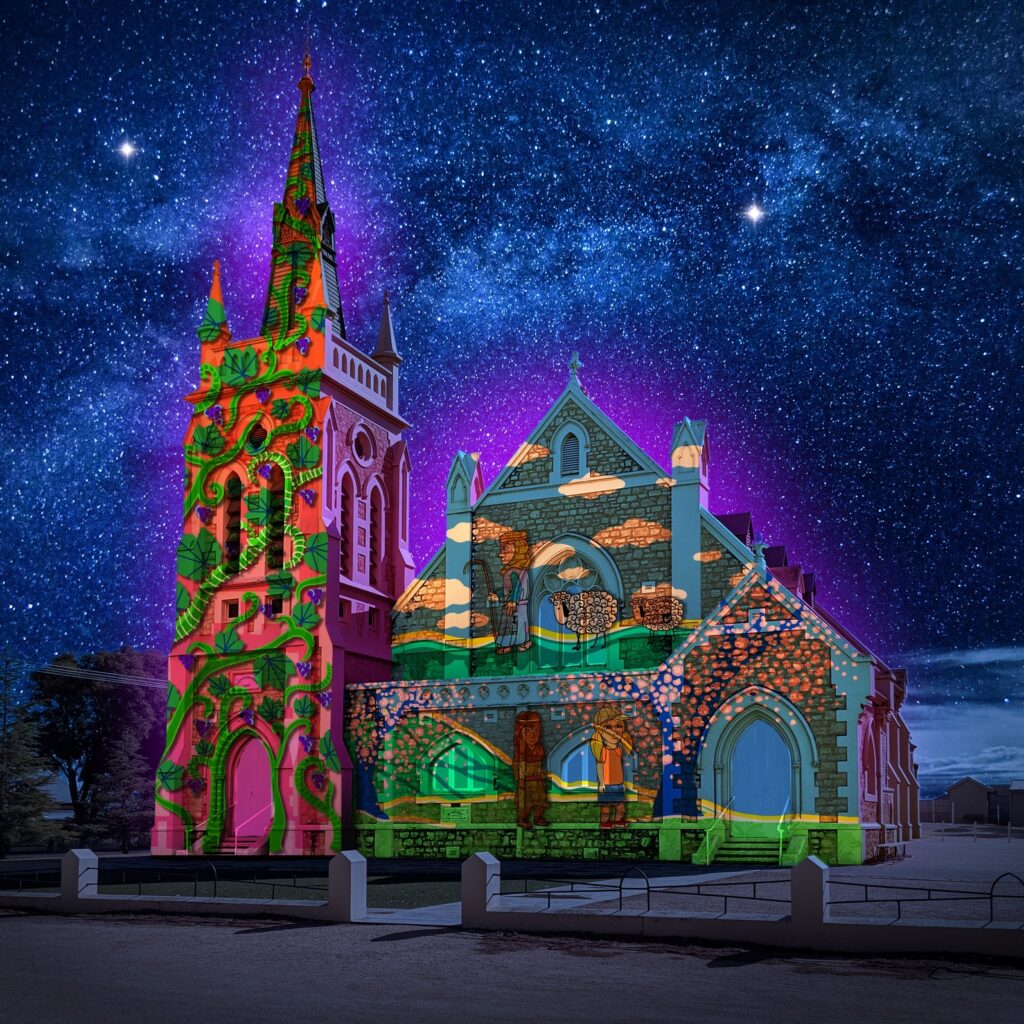
The management team was very focussed on utilising and developing local talent, with a view to building skills and training that lead to career and employment pathways for young and unemployed people. The project provided the opportunity for these people to work alongside a key partner – world renowned illumination creative artists Illuminart, who advised on creative design, direction and animation services, immersive and interactive concepts. They also mentored young people and others in the community on technical and creative installation, and conducted training workshops to help build skills to seek employment in animation, theatre, leadership, music, digital sound and technology and production management.
The creative team was set up and led by a local 19-year-old and included other local artists, musicians and representatives from Loxton High School. Several year 11 and 12 students, and their teachers, played a key role in creating the animations, projections and filming of the event. Five of the seven artists who created the background illustrations for the animation were from the Riverland, and three of these were from Loxton. With input from the creative team, two 2020 Loxton High School graduates undertook the storybooking of the animation, working closely with and being mentored by Illuminart animators and illustrators. They were both subsequently offered contracts with Illuminart to work on similar projects while at university.
The local input extended to the music, with all the music in the production composed and recorded by Loxton’s Karyn Skewes. Others involved included the Loxton Community Choir and the Lead Principal of Opera SA. Many of Loxton’s service clubs, community groups and residents were involved and contributed in various ways, including an enthusiastic group of older ladies who created a floral display inside the church, one of the key venues. Artworks related to the project, as well as other art produced by members of the local community, were displayed in Peace Hall on all the nights of SHINE, showcasing the amazing talents of the community.
All this work was captured by Six Foot Productions, who worked with and mentored the town’s young people to create a mini-documentary of the project from start to finish, with behind-the scenes footage capturing the passion and enthusiasm of all involved. The file was posted online a week after the event, reaching 30,000 people, with 12,700 views on Facebook, 264 likes and was shared 89 times.
The TTTT grant, which was funded by the Australian Government, contributed to engaging local companies to provide event equipment – audio, filming, lighting, security, event hire, container and marquee hire and contributed towards creative design by Illuminart.
Andrew Waters from DCLW said that there was no doubt that SHINE was an outstanding success, both for the local community and for the people it drew to the town to celebrate the 30th anniversary of Loxton Lights Up. While COVID presented challenges with restrictions, capacity limits and check-ins, it wasn’t a huge factor, given the event was held outside. A plus to come from it was that the organisers were able to obtain a relatively accurate count, with the registration app indicating that more than 6,000 people were present within the church grounds during the eight days of SHINE!
Andrew said, “On the final two nights we reached a near COVID-capacity of 1,000 people at any one given time. Total numbers on these nights would have been greater, as people came and went throughout the night. The project provided new opportunities to showcase the talents of local artists, musicians, actors and dancers and provided greater opportunity for the community to access the arts… a visual and auditory masterpiece.”
Beyond this, the project addressed the economic decline and disadvantage brought about by extended drought conditions across the Riverland Region. It was a celebration of creative and cultural experiences that are the lifeblood of the region, and was a key driver in re-activating the Riverland arts and entertainment industry. The project directly benefitted the region’s businesses that had been economically impacted by drought, injecting an estimated $1.8M into the local economy and creating new jobs in hospitality, retail and the arts.
Upper North Farming Systems’ (UNSF’s) mission is to facilitate capacity building and empowerment of the agricultural community across the upper north region of South Australia. The group focuses on adapting and connecting farmers so they can learn from each other and from their shared experiences, and not farm in isolation. They do this by bringing farmers together in what they call Hubs. It’s a large and diverse geographical area, encompassing Booleroo Centre, Crystal Brook, Hallet, Jamestown, Laura, Peterborough, Nelshaby, Orroroo, Quorn and Wilmington. It’s a harsh climate, and when times are tough, they are very tough. The region has experienced significant declines in population and services over the past 30 years and the social fabric of communities in many areas has become frayed.
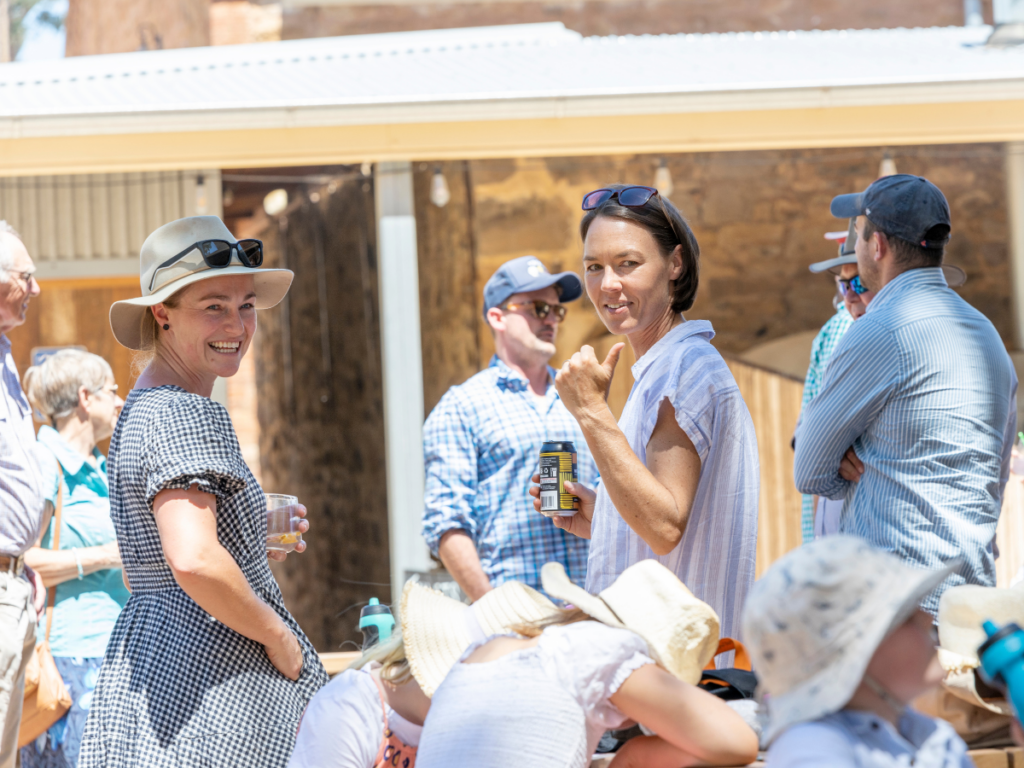
With the majority of communities in the region still reliant on agriculture, the social toll of the latest drought – the longest dry on record in 2020/21 – was evident, with symptoms of volunteer burn-out, self-isolation and mental health related issues.
Farmers know technology is essential, and farming systems have evolved significantly since the previous major drought, with stubble retention, improved efficiency of water use and a better understanding of livestock nutrition.
These communities are adaptable, open to innovation and aided through programs that promote not only professional connection, but also social and community connections, especially as these areas are typically not well-serviced by government research bodies and private consultants.
There are currently 11 Hubs under UNFS – eight geographical Hubs: Booleroo / Appila, Morchard / Orroroo / Pekina / Black Rock, Melrose, Gladstone / Laura, Jamestown, Nelshaby, Quorn and Wilmington and three non-geographic Hubs: Ladies on the Land, New Farmers and the Ag Tech Hub. The establishment of the Hubs in 2019 recognised the need to retain networks within the group and foster the tackling of issues on a smaller scale, as well as the importance of coming together on a social level.
A $20,000 Networks to Build Drought Resilience grant enabled UNFS to deliver the ‘Tools, Tech and Transformation’ workshop for farmers and agribusinesses. The key event was followed by a series of nine Hub events to provide the opportunity for networking, info-sharing, and learning about new farming systems and techniques to improve drought resilience. A ‘farmer-to-farmer’ learning model was recognised as a valuable and efficient mechanism to improve the productivity, profitability and sustainability of the agricultural industry in low rainfall zones.
“Through the Tools, Technology and Transformation event series, farmers and landholders have been provided with an abundance of information that can be adapted and changed on farm. Therefore, these tools that have been taken from the events can help farmers change their way of thinking and help their preparedness for drought or any other climate challenges they may face.”
The project reached 205 participants across 10 events that spanned six sector networks (Farm Business, Research Institute, NFP’s / Community Organisations, Consultants, Off Farm Business, Government Agency). Targeting farmers and agri-business directly, attendees learnt about tools aimed at improving efficiencies, sustainability and outcomes of operations like automatic feeding, as well as technology evolutions and business systems like satellite imagery on the farm scale, and succession and transition planning. Importantly, the solutions offered were all commercially available to be adopted on-farm, and farmers were able to speak directly with professionals in the fields, with discussions encouraged. They left with up-to-date knowledge to help them build more resilient farming systems.
The Hub events ensured accessibility for farmers who couldn’t afford too much time away from their land. They were able to talk with neighbours and researchers about the outcomes of the 2021 season and what they might be able to do better next time. Questions like when and how to de-stock, how to ensure you’re looking after genetics and bloodlines, and considerations around agisting, planting times, and upgrading tech vs repairing machinery were raised. Each Hub session included a training session in a tool, tech or system (identified from the key event by their elected Hub Representative), as well as a planning session identifying how to implement the new skills and knowledge on-farm, and where they require additional support.
Through the project, participants built knowledge and understanding of the risks posed by drought and climate change and learnt new concepts on a range of topics that can be adapted for drought and climate preparedness.
Communities had the opportunity to connect, train, converse (something many would not normally do in their usual day-to-day business) and lean on systems and each other so they are more prepared for future challenges.
South Australian Working Group focused on COVID-19 preparation and recovery
The First Nations Philanthropic Funders Working Group (FNPFWG) represents key Aboriginal-led health organisations in South Australia. The Working Group was established to oversee the creation of a community-informed and community-led model to direct philanthropic funding for First Nations communities across the state.
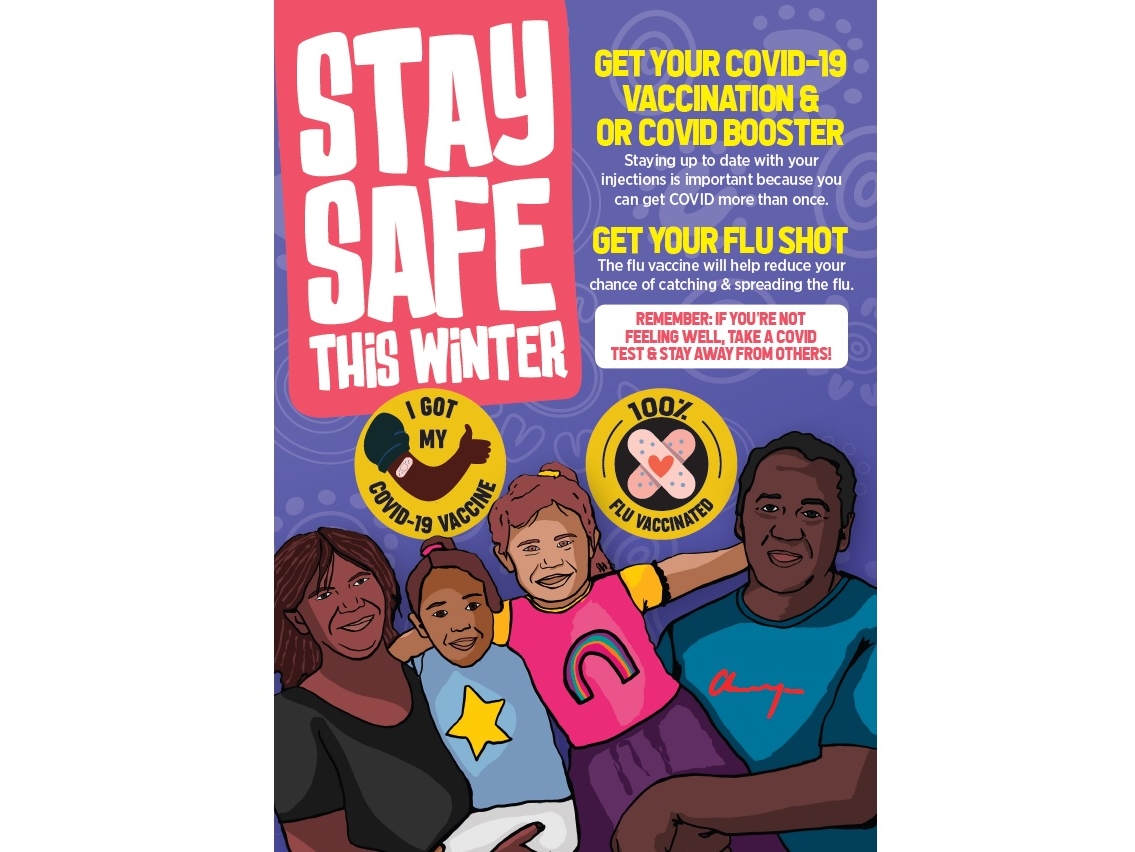
An initial priority of the FNPFWG is to work alongside their communities to respond to the impacts of COVID-19 in ways that best suit their specific situations – ensuring that Aboriginal health is in Aboriginal hands.
The FNPFWG has formed a close partnership with the Fay Fuller Foundation, who provide ongoing resourcing to the Working Group, and more recently, with FRRR. As the Funding Coordinator, FRRR is assisting to administer funds received from major donor partner, Paul Ramsay Foundation.
This funding is dedicated to addressing priorities identified by the Working Group, and the communities they represent, to ensure Aboriginal people are prepared to manage the ongoing impacts of COVID 19 in a way that works best for them. The combination of this partnership approach, together with flexible funding, will ensure solutions for First Nations people in remote, rural, and regional communities are locally-led and locally-determined.
Read the full media release here.
To read more about this initiative visit: https://www.fayfullerfoundation.com.au/first-nations-led-health-funding
Contribute to the Change was one of the project ideas developed at the 2021 Heywire Ideas Lab. The group of young people who developed the idea wanted to see mental health support become destigmatised and delivered in ways that were personalised to meet the needs of young people.
Riverland Youth Theatre (RYT), based in Renmark SA, adapted the Contribute to the Change idea to deliver a costume design project for young queer people in the Riverlands. Their project was called There I Am, and encouraged young queer people to image and create the best version of themselves through imaginative and colourful costumes.
RYT identified that within the region there were few safe spaces for LGBTQIA+ youth to explore their identity, nor groups aimed at supporting them. This resulted in a decline in mental health, and young people leaving the community because they lacked accepting and supportive adults and peers in their community. RYT developed There I Am to address this issue, aiming to create a safe, supportive environment where young struggling LGBTQIA+ youth could come and explore their authentic selves.
Participants spent five days working with a costume designer to create a costume that told their story and helped them imagine the person they wanted to be. The project built on the idea that self-expression through clothing can be an affirming and validating act for queer youth who are exploring their identity.
“I feel like my outfit kind of says ‘hey I’m here, I might not be able to talk, but I am still a person, and I can be present here, even if I don’t feel like it that much.”
Rowan, one of the youth participants, said that their costume helped them feel in control in a world where they have little control. “I kind of based it on a part of myself that I’ve suppressed over the years and bringing that into the light. With my costume it’s about being able to control whatever I want and it can all go perfectly.“
Projects such as There I Am have begun to establish Riverland Youth Theatre as a safe space for queer young people in the Riverlands. Youth have a place where they can seek support and be their authentic selves.
The FRRR ABC Heywire Youth Innovation Grants have continued to support the development of this safe space for LGBTQIA+ youth in Riverlands with another grant in 2022 for The Allies Project, which they once again adapted to their specific local context. Their project, Ally Merit Pins and Awards, empowers teens to decide what an ‘ally’ is and makes allies more visible.
The concept was developed by a young non-binary student who suffered from homophobic bullying and spoke of their exhaustion of not knowing which adults were safe or supportive. They proposed the merit badges as a way to encourage schools to be proactive in creating safe spaces for queer students and empower the queer community within their school. The project was awarded a $10,000 Heywire Grant and will be delivered in 2023, continuing to ensure that there a place within the Riverlands where LGBTQIA+ youth can find their tribe.
The community group I’m Not Afraid To Talk (INATT) partnered with the University of South Australia (UniSA) to deliver a mental wellbeing program through Greater Flinders and Eastern Eyre football leagues / clubs to help adolescent and adult men in rural communities to improve their mental health and reduce the risk of suicide.
Working around COVID restrictions, cancellation of the football season, harvesting and extreme weather events, workshops were held in Kimba, Tumby Bay and Cowell, with a joint follow up session via Zoom. The workshops were supported by a $19,900 In a Good Place grant that was funded by CCI Giving.
Each four-hour workshop featured local key speakers sharing their lived experienced, followed by a series of activities that focused on how men may be perceived by others and how they perceive themselves, share experiences, and the importance of ongoing open conversations about mental health. A Toolkit Resource was collaboratively developed by UniSA and INATT after the workshops to guide clubs in planning activities to promote mental wellbeing.
The steps and strategies listed in the resource are based on community development principles and give clubs ideas on how to get started with planning mental wellbeing activities. This was introduced during the follow up session and made available to each group.
Due to the changes to the program, there was an underspend of funds. With the permission of FRRR, INATT ran an additional workshop for women in Kimba. This was a great success with approximately 80 women attending from Kimba and surrounding communities.
The workshops were the greatest success of this project as was evident by the high praise received by participants. The workshops assisted in improving attitudes towards mental health and help seeking. Participants also reported an increase in confidence and comfort in discussing mental health. Some of the comments included:
- “Mental health discussion rarely starts without a major poke”.
- “Probably will never be comfortable to do this but more equipped to have a go”.
- “Eye opening and is going to help myself and community”.
- “Very well done to get tough blokes thinking and talking”.
- “We don’t have many supports, apart from each other at the moment”.
- “Reassuring to know you not alone, great advice on how to deal with mental health”.
- “Was a great night, confronting at times but that made it so worthwhile and a good laugh at the end”.
The achievements of this project have been numerous with the strengths of both collaborators on this grant put to best use. INATT has extremely strong links with the Greater Flinders and Eastern Eyre communities which was evident by their excellent leadership and facilitation of the workshops and the level of attendance.
Around three hours drive from Adelaide, along the beautiful coast, the Southern Yorke Peninsula Community Hub (SYP) is a central organisation that offers a range of services to its community.
From faxing, to printing, to car and boat licenses, the Hub provides tourist information and is home to the local Salt Lakes Gallery. With a role as big as this in the community, it makes sense that the Hub would be crucial during emergencies.
In November 2019, bushfires occurred in isolated rural areas along the Peninsula, putting many towns at risk. The community of Yorketown was in the fire path until a wind change moved it along to then endanger the township of Edithburgh. The fires impacted power supplies, road closures and communications for prolonged periods. The SYP Community Hub supported the community as a response centre throughout this event.
Since the 2019 bushfires, SYP Community Hub has been heavily involved in coordinating disaster recovery services. This included purchasing a custom-built trailer, the first in the Yorke Peninsula Council area. Using a $24,950 Strengthening Rural Communities (SRC) grant, funded by a private donor, the trailer has become a multipurpose community resource.
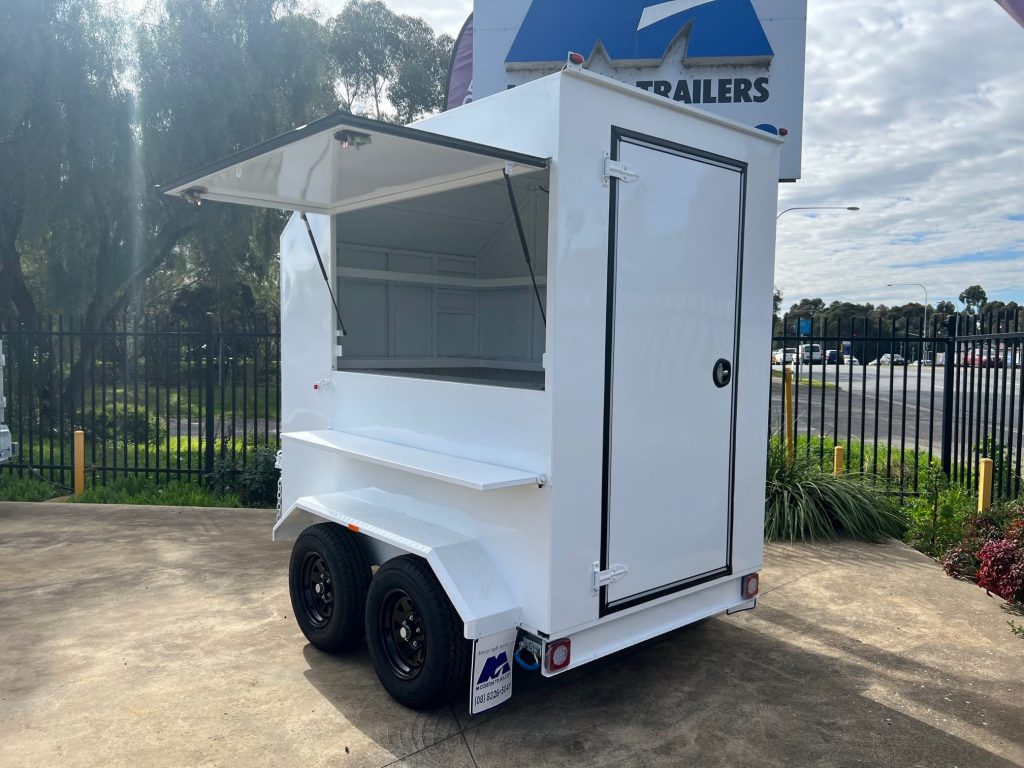
During emergencies, the trailer will enable deployment of supplies such as food, water and basic first aid. It will also assist in distributing supplies to volunteers and act as a rest station during incident response. The versatility of the trailer also means that it can be used during community-led events.
The impact the trailer has had on the community has been exceptional. “The response from residents is one of pride in its completion and the feeling of readiness should they once again be faced with an crisis like the 2019 bushfires. The community is better prepared, trained appropriately and with a strong band of volunteers.”
Like many plans during the last few years, the start of the project was delayed due to COVID. Materials were in short supply and the engineering firm responsible for building the trailer was hit by COVID and forced to close for a period of time. But once they were able to safely get back to work, the trailer came together nicely.
The population of the District Council of Yankalilla is 5,500, spread across 750 square kilometres within 10 small townships. Some families are geographically isolated, farmers are doing it tough and there are a number of people who are struggling with low income, drug and alcohol issues, as well as family violence. There are not many opportunities for work and no public transport options for those who don’t have a car. While some support services are available in the community, most are outreach and not located in the district. In general, anxiety levels are higher than normal across the population groups. COVID fears and restrictions have added to this anxiety. Community members who are struggling usually want to connect with someone in their district to talk things over and find out what support is available.
The Council’s plan was ambitious – establish the Fleurieu Coast Community Network (FCCN) to foster help-seeking practices and build community connectedness and strength, with a focus of improving mental health. They successfully applied for a $9,000 In a Good Place grant from FRRR, funded by CCI Giving, to launch their plan to engage a coordinator who could provide the ‘first point of contact’ role and upskill community champions to expand the service across the district.
On paper, it was straight forward – set up a network of service agencies and community organisations, create a calendar of events focused on mental health and wellbeing messages, host informal community conversations and support community leaders, by providing them with mental health and wellbeing training. What they didn’t expect was COVID and local restrictions, which changed the planning and execution of all elements of the project plan. But each hurdle was successfully negotiated.
Meetings to form the Fleurieu Coast Community Network (FCCN) were held in a blended format. They received excellent feedback and became very popular within the sector. The Network is now well established, with high levels of information sharing and collaboration across the core group of about 22 organisations, which includes more than 70 service providers, businesses, local agencies and individuals who receive regular updates on FCCN activities and come together to connect, identify community issues and mobilise resources to provide information, advice, support and training.
The original concept of an event calendar was very time consuming to deliver and was not engaging as many people as the organisers had hoped. A decision was made to embed the events and activities within the Council’s web-based calendar and event information is also shared in digital flyer format through the Network emails.
Community conversations were held bi-monthly. This group was facilitated by Skylight Mental Health and themes discussed included community wellbeing during COVID and suicide prevention support. As a result of these conversations and other events, 14 individuals registered as Community Leaders; people who could be called upon by local community members when they needed information or just a friendly conversation. They are seen as a stand-by informal ‘Crisis Response’ group – people who are willing to do what is needed when the situation arises. So far, there has been a food delivery response for people isolated due to COVID or anxiety about COVID, as well as informal support for low income parents.
Because of travel restrictions, the planned community presentations and training offered had to be redesigned. The Network partnered with Country SA Primary Health Network to conduct the Fleurieu Coast Wellbeing Expo, which was very well attended by locals. They also supported the local Gone Fishing Day, which focused on mental health and was attended by more than 80 people; Lullabies of the Fleurieu 2022 for parents engaged over 100 people; No Scaredy Cats for Parents supported 10 families with children experiencing anxiety; and the Now and Next Program for parents of children with a disability.
Excitingly, the Council funded the program from 1 January to 30 June 2022, due to the successful pilot and the impressive involvement from service providers and Community Leaders. This allowed the Project Officer to sustain the momentum and goodwill of the FCCN and facilitate Accidental Counselling Training for Community Leaders.
Claire Taylor from the District Council of Yankalilla said, “This grant has been so influential in assisting our Community Team to establish and consolidate the Fleurieu Coast Community Network. It allowed us to demonstrate that the Network is truly valuable in a small regional district where we have to rely on good connections and relationships to maximise the access to services for our residents.”
On Ngaiawang Country
The Morgan Volunteer Support Group is a not-for-profit organisation that delivers Meals on Wheels Monday to Friday including public holidays, for the Morgan, Cadell and Mount Mary areas in SA’s Riverland region. The Meals on Wheels service, which has run for more than 35 years, is invaluable for those requiring assistance to remain in their homes for as long as possible, as well as those who have problems such as a broken limb, drug rehab or failing eyesight, which diminish their ability to shop and cook. Additionally, Meals on Wheels delivery offers important social contact for people who use the service and may otherwise be socially isolated. This is of particular concern for those living in regional areas.
The Support Group has partnered with the local prison training program to cook the meals. This not only helps them gain skills for a future trade, but participants also gain satisfaction from helping the community.
In the past, the Morgan Meals on Wheels service used a car owned by Meals on Wheels SA. However, they wanted to sell the vehicle and instead have volunteers use their own cars. After some discussion, Meals on Wheels SA agreed to retain the vehicle for a further three years, to give the Morgan volunteers time to raise funds to acquire a vehicle of their own. Otherwise, the service would most likely cease.
This was also an opportunity to purchase a newer, more reliable, efficient and safe vehicle, as the car they were using was more than 10 years old. The Morgan Volunteer Support Group undertook a lot of local fundraising and secured a $10,000 grant through FRRR’s SRC program, thanks to the support of the Kellogg Australia Charitable Foundation. With COVID causing supply-chain issues, demand for second-hand vehicles was high but after much searching, they purchased a second-hand Toyota Camry Ateva. It met most other requirements – most importantly room for hot boxes, baskets and eskies.
In addition to using it for Meals on Wheels delivery, the group is also seeking to expand their delivery services. They also have plans to make the vehicle available at other times to offer transport solutions to the community, raising additional funds for the Support Group, at the same time as offering a valuable service for those who can’t drive or don’t own a car.
The group is rightly proud of what they achieved, on time and on budget.
“We had help from many different groups – Waikerie Men’s Shed, Waikerie Woolworths, Morgan Friendly Grocer, Morgan Roadhouse, Morgan Home Hardware, Morgan Commercial Hotel, Morgan Cadell Golf Club and hundreds of individuals.
“The car has been operational since March 2022 and is working well. We have been delivering meals for Meals on Wheels and for Morgan Activity Centre. Current customers can be assured of an ongoing service,” said Jakob Gamertsfelder, Secretary / Treasurer of the Morgan Volunteer Support Group.
For more inspiring stories like this, head to our FY 2021/22 Annual Review.
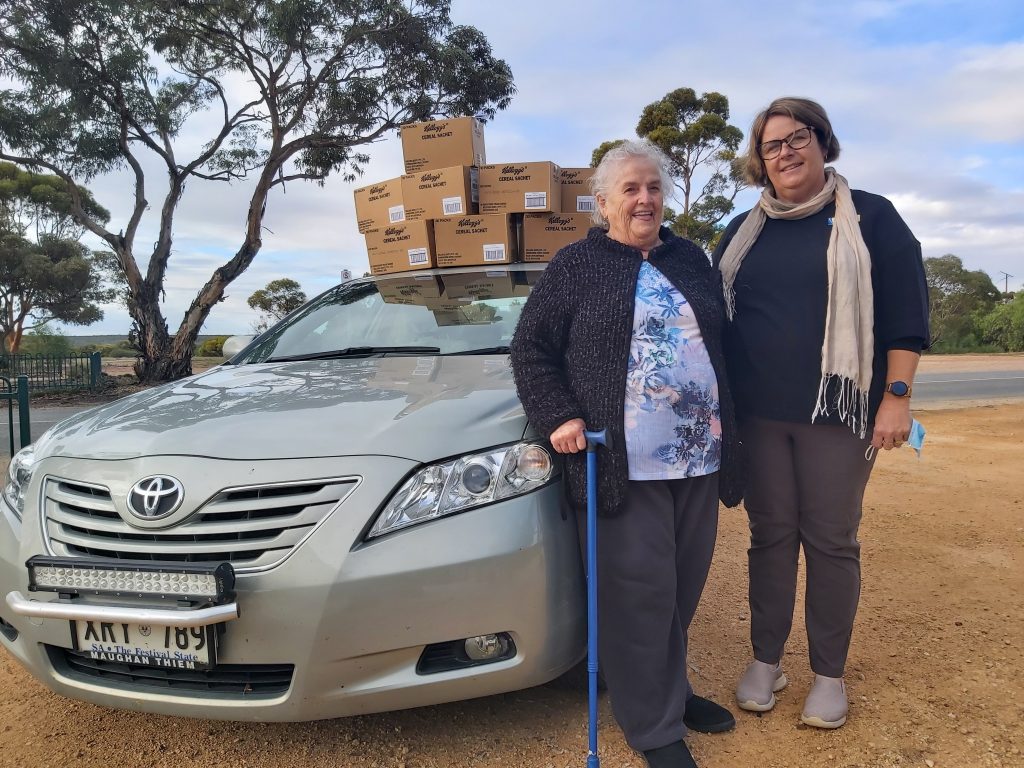
On Ngadjuri, Peramangk and Kaurna Country
The Barossa Valley in South Australia is a renowned wine-producing region northeast of Adelaide. When the COVID pandemic hit, tourism and wine exports significantly decreased, which placed a big financial stress on families in the Barossa. With the added pressure of drought, the region was seeing distressing numbers of mental health incidents and homelessness impacting the community.
Not-for-profit organisation Foundation Barossa has been working hard in the region since 2002 to encourage and support philanthropy to build and nurture their own community’s strength and assets. In recent years, Foundation Barossa has worked closely with several schools in the area where extra support is needed.
Foundation Barossa has been a big supporter of FRRR’s Back to School (BTS) program for a long time, and liaise with school principals and school welfare teachers to ensure that families in need receive the extra support they require.
Five hundred and fifty vouchers worth $50 were distributed to 13 schools, both primary and secondary, for the 2022 school year, thanks to the Fire Fight Australia Fund and a private donor who support FRRR’s BTS program. Students could use these vouchers to purchase school supplies like uniforms, stationery, lunchboxes and anything else that would make their education experience easier and relieve some of the financial pressure from families.
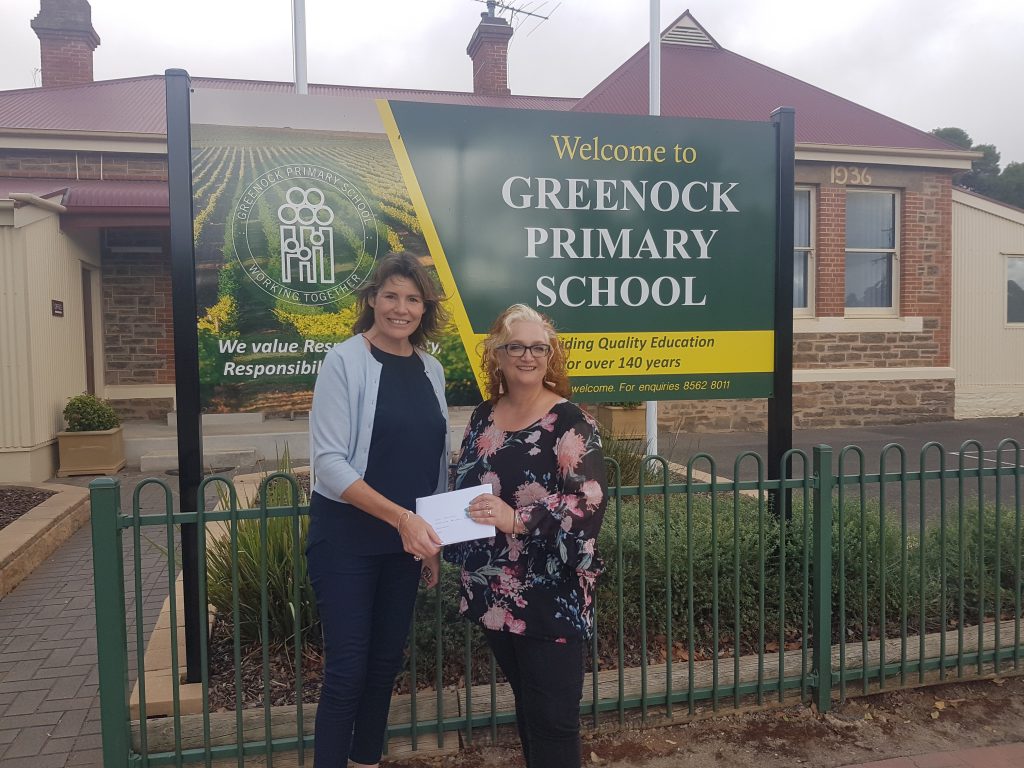
Together with matched funding provided by the Origin Energy Foundation through FRRR and local sponsorship from Barossa Real Estate, a further 203 vouchers were distributed, bringing the total to 753; the Foundation’s highest number to date. The success of the voucher rollout has been measured through an increase in student attendance and retention, and in general an improvement in student wellbeing. The Foundation has also noted a big benefit to the teachers at these schools who would sometimes become distressed or concerned for their students.
Here are some of the happy testimonials:
- “I would like to say thank you very much for choosing our family to receive the vouchers from Foundation Barossa. I lost my job back in October and am a sole parent. My pride was allowed no place when my boys handed them to me. Having only found a part-time job in the last week means the vouchers were very much appreciated and unexpected.” – Parent, Nuriootpa High School & Flexible Learning Centre
- “Teachers were very grateful and expressed they felt better going into the school holidays knowing that students had access to vouchers.” – Nuriootpa Primary School
- “Thank you so much for the Kmart voucher. My daughter purchased a new pencil case and pencils for schools. She thought Christmas had come early!” – Parent, Tanunda Primary School
- “We had a family arrive at our school at the beginning of term 2 who were homeless and living in a caravan with family members. On the first day when we met the mum, we gave her a voucher for each student to help get them some school supplies. She was so thankful that she was brought to tears, as she said they needed new school bags and she would now be able to get those.” Kapunda Primary School
For more inspiring stories like this, head to our FY 2021/22 Annual Review.
The Loxton region of South Australia is the central hub of the grain producing area of the Northern Murray Mallee but also produces a range of other crops including citrus, wine grapes and almonds, as well as livestock. However, this productive region experienced three years of drought between 2017-2019 and, at the time this project was put forward, was in its fourth year of drought, with more than 2,000 farming business affected.
Farmers and regional communities more broadly, face numerous barriers to accessing traditional forms of mental health support, due to reduced access to health professionals in rural areas, long waiting lists, stoicism, stigma around mental health and a tendency to minimise problems. There is often distrust of many health professionals and hesitancy in engaging with mental health services, who farmers perceive as not understanding their way of life.
Given these issues, and the significant impact that long-running dry had on the whole community, wellbeing had been a significant focus in the Loxton community. For example a sell-out musical, ‘Kick Off Ya Boots’, written by local farmer John Gladigau, and performed by locals, had successfully started conversations about mental health and wellbeing. The success of ‘Kick Off Ya Boots’ prompted Dr Kate Gunn, Clinical Psychologist, Founder of ifarmwell.com.au and Senior Research Fellow in the Department of Rural Health at the University of South Australia (UniSA), to continue working with locals, including the ‘Kick Ooff Ya Boots’ team, to implement what became known as the Vocal Locals project. In addition to providing a way for the community to better support one another, it was also an opportunity to further research the uptake of health and mental-health promoting behaviours within communities, especially as droughts are expected to increase in their frequency and intensity in coming years.
Supported by a $148,250 grant through the Future Drought Fund’s Networks to Build Drought Resilience program, this project was co-designed locally to enhance drought resilience by strengthening the capacity of professional, social and community networks in Loxton. The aim was to support mental health in local networks by training local ambassadors (i.e. the Vocal Locals) at events and via the freely available ifarmwell modules, and then supporting them to pursue their own wellbeing goals with a local wellbeing coach, and post about what they were doing for their wellbeing on social media.
In addition to drawing on many years of research in this field, conducted by Dr Gunn and her team, the approach built on the local success of a musical written by Loxton farmer John Gladigau, who agreed to act as the Program Coordinator. His musical ‘Kick Off Ya Boots’ celebrated rural life, explored challenges commonly faced by farming families (e.g. succession planning) and with guidance from Dr Gunn, incorporated wellbeing messages and tips to cope with difficult circumstances. The logic was that it would be powerful if individuals from the region saw similar wellbeing messages being reinforced by multiple local people they know.
There were five parts to the Vocal Locals project:
- Training: Ten ‘Vocal Locals’ and 17 other community members participated in a half-day mental health knowledge and skills workshop. A further half-day session for the Vocal Locals helped orientate them to how the Vocal Locals campaign would work, including how to brush up on their social media skills. The Vocal Locals also completed the five, freely available online ifarmwell modules, a tool for reducing distress and improving mental wellbeing among farmers, and encouraged others to do the same.
- Wellbeing coaching: Vocal Locals each completed eight wellbeing coaching sessions designed to help them pursue their own wellbeing goals, and post about them on social media.
- Social media posting: The local volunteers posted roughly once a week on social media about their wellbeing journey, and there was a public Facebook group created which attracted 870 followers, with 6,800 people reacting to, commenting on, or sharing the posts.
- Communications campaign: A broad communications campaign included a flyer drop to 2,500 households in Loxton, a two-page spread in the Riverland Football League match day program, interviews on local community radio, articles in The Murray Pioneer and the Stock Journal. The ifarmwell team also supplemented Vocal Locals’ posts on the public Vocal Locals Facebook page, with posts communicating six key wellbeing messages in different ways.
- Campaign dinners: Vocal Locals attended three dinners with the project team, with the last also involving family members and support people, and representatives from local organisations and government.
In an article written by ABC Digital, John Gladigau said it had been great to continue the conversations sparked by his musical.
“While these are not taboo subjects, we don’t talk a lot about mental health and wellbeing,” he said. “However, people are willing to [share] if they have the opportunity to.”
Mr Gladigau said he and Dr Gunn had been impressed with how open the participants had been in talking about their struggles.
“Even some of the really tough times… people have related to that and have jumped on and talked about their own experiences and encouraged each other. I think it’s about normalising those conversations,” he said.
Dr Gunn explained that the campaign was designed to operate at two levels.
“At an individual level, the initiative provided the Vocal Locals with the opportunity to learn more about mental health and wellbeing, and strategies that can help improve it, and to work towards their own wellbeing goals. At a community level, the initiative was designed to share practical, evidence-based strategies to help community members improve their wellbeing, increase their understanding of how to achieve positive mental health and wellbeing, and normalise talking about mental health and wellbeing and supporting others to improve their wellbeing.
“We have also been blown away by the creative ways that Vocal Locals used their role to get messages about mental health out into the community. They shared information about the initiative in their workplaces, sporting groups, farming systems groups, and agricultural bureaus for example. One Vocal Local who is also an egg producer, printed short messages on his eggs to raise mental health awareness – for example, one message was “give it a crack”. Another Vocal Local who included a photo of his ram wearing a Vocal Locals hat on the front cover of his ram sale catalogue spoke about the campaign to an audience of 80-100 local farmers just prior to the ram auction. The initiative has had such a profound impact on another Vocal Local that he pitched a radio segment to local community radio, to bring people together to share stories and talk about the ups and downs of being human. We are really proud of the impact that it had.”
Dr Chloe Fletcher, Research Associate, UniSA added that, “Our evaluation of the impact of the project in the Loxton community showed that there were statistically significant increases in the number of conversations people were having with others about mental health and wellbeing, their comfort in speaking to others about mental health, and their engagement in wellbeing activities.”
WATCH THIS VIDEO to see what the group said about the experience.
For more inspiring stories like this, head to our FY 2021/22 Annual Review.

